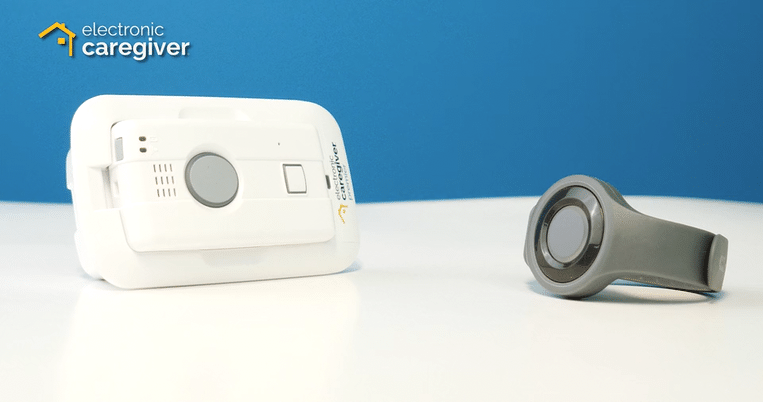Falls Can Have Severe Consequences
Falls pose a concern for the elderly and their loved ones. In the U.S., one out of four adults aged 65 and older falls each year. Falls can result in injury or death. Furthermore, over half of all falls happen in the home, according to the National Council on Aging. For seniors living alone, this is especially worrying, as they could end up lying on the floor without help for hours. The dangers associated with falling are leading caregivers, family members, and the aging to seek out solutions, such as medical alert and fall detection devices.
What Causes Falls?
Several things can cause a fall. According to the CDC, conditions that increase a person’s risk of falling include:
- Lower body weakness
- Vitamin D deficiency
- Difficulties with walking and balance
- Use of medicines, such as tranquilizers, sedatives, antidepressants, and even some over-the-counter medicines
- Vision problems
- Foot pain or poor footwear
- Home hazards or dangers (broken or uneven steps, throw rugs, or clutter that can be tripped over)

Is There a Device that Detects a Fall?
If you or your loved one is at risk for falls, owning a medical alert system or fall detection device can help. These devices allow the elderly to age in place and provide a sense of security and peace of mind. However, with all the products out there, choosing the right system can feel overwhelming. Electronic Caregiver leads the way in the medical alert and fall detection space with systems that are both technically advanced and easy to use. In addition to Electronic Caregiver, other brands on the market include Life Alert, Lifeline (formerly Philips Lifeline), and Medical Guardian.
These companies offer everything from simple fall detection devices to a suite of telehealth services. Here’s a look at how they measure up.
Life Alert
With the slogan, “I’ve fallen, and I can’t get up!”, Life Alert is a familiar name. Life Alert offers a neck pendant with an emergency button and a large waterproof help button that can be placed in the shower or another location. In addition, the company has a help-on-the-go device with GPS and an audio monitoring system for continuous protection in the home.
While Life Alert provides reliable services, their devices lack style and personality, and their purpose is obvious. Therefore, this may not be the best option for seniors who want to be discrete about using these services. Also, Life Alert only offers the basics. Customers don’t get any additional features other than protection in an emergency. So, if you want a device that can also provide medical reminders or monitor your vitals, this is not the right choice.
Lifeline
Lifeline offers both a home system and mobile system. The HomeSafe Standard medical alert system comes with a stationary communication device and a help button that can be worn around the neck or on the wrist. Customers have the option to purchase the system with AutoAlert fall detection services. They can also choose from a landline or cellular connection. Lifeline offers a mobile solution that includes a help button, too. It is worn around the neck, includes a GPS locator, and automatic fall detection.
Additionally, Lifeline has an app that helps clients manage their Lifeline service. But the app is the only added benefit the company offers. Other than that, its services are limited to basic personal protection. And like Life Alert, Lifeline’s products lack style and are not discrete. It is also missing telehealth features, which are important to many individuals using such devices.
Medical Guardian
Compared to Life Alert and Lifeline, Medical Guardian offers a wider selection of on-the-go systems. Customers can choose from the Mobile 2.0 and Mini Guardian neck pendants or the MGMove wrist pendant. The Mobile 2.0 includes an emergency button, location monitoring, and access to MyGuardian, which enables caregiver connection. The Mini Guardian includes a two-way speaker, location tracking, 4G cellular network connection, and continuous monitoring services. Medical Guardian’s MGMove Smartwatch provides access to emergency services, the ability to receive messages, check the weather, and track steps.
Additionally, Medical Guardian offers home systems. The Home 2.0 system features a voice assist button and can sync with an included necklace or wrist band. The system includes access to the MyGuardian portal and app. The Classic Guardian connects to a landline telephone and features an emergency call button. It can also sync with a necklace or wristband and provides access to MyGuardian.
While Medical Guardian offers a range of products and services, the company doesn’t offer any form of telehealth or way for clients to connect with a doctor in a non-emergency situation. It also falls short in style and capability. Color selection for the pendants is very limited. Furthermore, while the MGMove Smartwatch may be unique, it isn’t a practical solution for everyone. Many seniors with poor eyesight or unsteady hands have trouble pressing icons on small screens. Therefore, using this device may end up causing some people more frustrations than benefits.
Electronic Caregiver
In comparison, Electronic Caregiver clearly stands out among the rest. The company has created some of the most innovative and comprehensive health management products on the market today. The Electronic Caregiver Premier system includes a mini controller, leather carrying pouch, a standard gray pendant, and a color pendant. The pendant can be worn on the wrist or around the neck. With the Premier, customers get help at the touch of a button, GPS location, medication reminders, and personalized messages. They also get access to Electronic Caregiver’s Family Caregiver app and pocketMD telehealth services. Clients can purchase a fall detection device that automatically senses if they fall, as well.

In addition, Electronic Caregiver offers a home-based solution called the Pro Health. This system truly excels in its capabilities because it features much more than just personal protection. Along with 24/7 emergency response, the Pro Health provides medication reminders, personalized messages, telehealth services, and vitals monitoring and alerts. Health data collected via the Pro Health can be shared with designated family members, caregivers, and providers. The Pro Health also comes with an emergency wrist pendant. Not to mention, Electronic Caregiver’s pendants don’t look like a medical device for seniors. They have a sleek, modern design and come in several different colors. Furthermore, with access to pocketMD, clients can connect with a wide selection of providers, ranging from medical to mental health.
The Next Level of Care
What really sets Electronic Caregiver apart is the company’s newest and groundbreaking product, Addison Care. Addison, launched January 2021, is a Virtual Caregiver that assists clients in managing their health from a computer or tablet. Addison Care provides all the features the Pro Health offers, including the ability to place an emergency call. However, Addison is voice and touch activated. Above all, Addison makes health management fun and engaging through playful interaction and customizable features throughout the Virtual Caregiver’s world. There is absolutely nothing else on the market like Addison. With Addison, clients only need one device to manage all their health care needs. And with regular updates, Addison will soon do far more.
Researching Medical Alert and Fall Detection Devices
To sum up, medical alert systems and fall detection devices can save lives. They ensure that, in the case of an emergency, you or your loved one gets the help they need fast. But certainly, choosing the best option, depending on your specific needs, will take a bit of research. If you’re interested in learning more about Electronic Caregiver’s products and services, visit electroniccaregiver.com or call at 833-ECG-LIFE.
